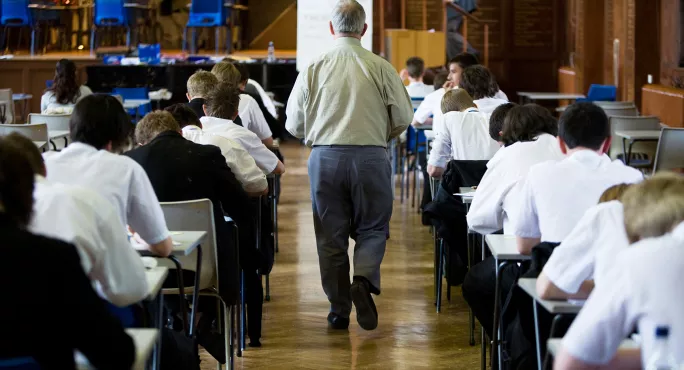Rise in GCSE resits reveals ‘misery of the policy’

When GCSE results were released in the summer, there was a clear uptick in the number of students aged 16 failing to achieve a pass mark of grade 4 or above for English and maths.
Specifically, 27.7 per cent of students aged 16 failed to achieve a grade 4 in maths and 28.4 per cent failed to achieve a grade 4 in English language. By comparison, in 2021 the figure was 22.1 per cent for maths and 19.9 for English language.
This increase was not surprising: not only had these students suffered some of the longest pandemic disruption to their learning, but they were also facing a marking regime that was trying to return as close as possible to pre-Covid levels.
Indeed, the outcomes achieved were more or less in line with pre-pandemic scores.
The impact of this, though, was that - as shown in new data from the Department for Education released today - there was a huge spike in the number of students taking resits in the November exam series.
Specifically, the overall number of resits for the two subjects was 125,615 - a massive 23 per cent increase on the previous year. And the figure was higher than the 2019 figure of 109,495, too.
The resit entry numbers by subject were:
- 60,365 for English language - up 29 per cent on 2022.
- 65,250 for maths - up 18 per cent on 2022.
Within maths, there is the option to take the foundation or higher paper, with 95 per cent, unsurprisingly, opting for the easier foundation paper. Those taking the higher paper are more likely to be those hoping to boost their grade, especially in light of a harder marking scheme this year.
Of those resitting, the majority were first-time resitters now in Year 12 (ie, the year after their GCSEs), accounting for 75,555 entries. Year 13 and above - those resitting for a second time or more - accounted for 50,035 entries.
GCSE resits policy: demands for change
For those in the sector who have long argued that the pass/fail criteria for English and maths is too harsh, the fact that so many students are resitting is yet more proof that reform is needed.
Geoff Barton, general secretary of the Association of School and College Leaders, who is one of these voices, says the rising number of resits is one of the bleaker pre-pandemic trends to return.
“The sheer scale of the misery of the resit system is laid bare in these statistics - nearly 126,000 young people condemned to retake exams in which they have already struggled by a remorseless funding rule that papers over the deeper problem with our current exam system,” he says.
“This is 23,000 more students than last year, largely because the grading bar has been raised to bring it back into line with pre-pandemic grading standards.”
He adds that while he understands the government’s position that the resit policy is meant to give students “another chance to obtain at least a grade 4 in these important qualifications”, the reality is that most will never pass and so never receive a qualification - a situation that benefits no one.
“We need literacy and numeracy assessments which build confidence and competence in these vital skills, thereby better serving the needs of employers and giving every young person the dignity of a qualification of which they can be proud,” Barton says.
Given that a change in government may well occur next year, this desire for a new system could be realised. Labour has said, admittedly in the distant past of 2018 when Angela Rayner was shadow education secretary, that it would scrap the GCSE English and maths resits policy.
“Instead of empowering them for the love of learning, they are going to be feeling like they are failures because they are having to take exams that are really not going to make any difference to them at a future date,” Rayner said at the time.
A desire to reform GCSEs around maths and English does appear to remain on the cards for Labour though, with its 5 Missions for a Better Britain document arguing that the current model means there has been “virtually no improvement in the number of young people achieving essential maths and English GCSE qualifications”.
Tes contacted the Department for Education for its view on the return to higher figures for resits but had received no reply at the time of publication.
When will the resit results be announced?
Meanwhile, for the thousands of students who resat these exams, debates around future policy development will mean little as they face a tense wait until Thursday 11 January, when resit results will be announced.
Schools and colleges will receive the results the day before, on Wednesday 10 January.
You need a Tes subscription to read this article
Subscribe now to read this article and get other subscriber-only content:
- Unlimited access to all Tes magazine content
- Exclusive subscriber-only stories
- Award-winning email newsletters
Already a subscriber? Log in
You need a subscription to read this article
Subscribe now to read this article and get other subscriber-only content, including:
- Unlimited access to all Tes magazine content
- Exclusive subscriber-only stories
- Award-winning email newsletters
topics in this article



